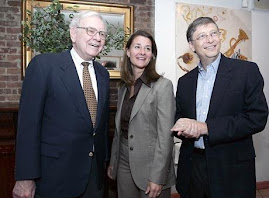One of my investment principles is never to be greedy and fear of market sentiment (market downturn). In other words, overcoming greed and fear. Another important closely related principle is never invests in anything that you don’t really understand. Why closely related? If you were not greedy, why would you want to jump into an investment product that you don’t understand? If you were not greedy, why would you believe in a letter that tells you that you have won a car for doing absolutely nothing? If you were not greedy, why would you still believe in “free lunch”?
Hedge fund is another investment products which is relatively new to most Singaporeans. A few years ago, local authority allows hedge fund to be set up here
.JPG) but limit to high net-worth individuals. If I remember correctly, it started to appear on the headline somewhere after year 2000. In my own words, hedge funds are funds that undertake risky investments. The funds can go long or short; it can speculate on an M&A news or short the forex during a crisis, or long or short on options or any derivatives, take up arbitrage opportunities, or anything that can generated high return. The funds may borrow more money to speculate and have complex strategies to make money. It’s like Chow Yun Fat having a secret method to get royal flush most of the time. Perhaps many gamblers don't know (or refuse to know) that the owner of a casino doesn't gamble; he invest. He never gamble as he knows one simple truth; banker always win. This winning chance/probability has been incorporated into every game. So he just invest his money in creating those games.
but limit to high net-worth individuals. If I remember correctly, it started to appear on the headline somewhere after year 2000. In my own words, hedge funds are funds that undertake risky investments. The funds can go long or short; it can speculate on an M&A news or short the forex during a crisis, or long or short on options or any derivatives, take up arbitrage opportunities, or anything that can generated high return. The funds may borrow more money to speculate and have complex strategies to make money. It’s like Chow Yun Fat having a secret method to get royal flush most of the time. Perhaps many gamblers don't know (or refuse to know) that the owner of a casino doesn't gamble; he invest. He never gamble as he knows one simple truth; banker always win. This winning chance/probability has been incorporated into every game. So he just invest his money in creating those games.Hedge funds seldom market its products, or to put it correctly, they are quite secretive in nature. Less the big funds, some of the smaller ones may collapse without appearing on the paper. What is a “hedge of hedge fund”? As the name implied, it is a fund buying into a basket of hedge funds. In my opinion, that’s really extra spray (多此一举) (khey jua – hokkein). Can you imagine yourself diversifying risk by spreading your fund into more of the same types of product at the expense of returns?
Banker: “Sir, managed by our experts, our hedge fund can generate exceptional high return.”
You: “Ya but a bit risky for me”.
Banker: “Sir, we also can diversify you risk by spreading them into various hedge funds.”
You: “Oh, I know diversification from my study. It reduces systematically risk. Ok, I’ll buy.”
Me: “………….”
People buy this kind of product, or worst still, they buy capital guarantee hedge fund. In my opinion, this is an insult to intelligence! No offence to those who believe in it.
I never or never will invest in hedge fund for two reasons – I’m still a poor chap and even if I get to the high net-worth group, I will never buy hedge fund. The reason is simple – I don’t gamble. Since the day I learned my lesson, I never gamble….. ok, maybe just $20 on ToTo. Generally speaking, Chinese like to gamble and I am a Chinese. But after a few lessons, I make it very clear to myself - never gamble and never invest in anything that I don’t fully understand.
My Personal Experiences
1) Warrants. When I started to learn stock trading in the 90s, the warrants were very buoyant then and they offer good rate of returns. What is a warrant? Recently I visit a colleague in NUH as she gave birth to her second girl; she asked me what is a warrant. I thought usually such visit would end up talking about babies, weight or delivery time, diapers, one month curfew, blah… blah... blah. But we spent most of the time talking about stocks. Warrant is a call option, literally a piece of paper that is cheaper than its underlying asset and generally people use it to speculate. A Warrantholder does not enjoy the rights like an ordinary shareholder. A warrant has an expiry date after which the paper will be worthless. I don’t think I want to go into the detail as it may take up another half a page.
So I traded warrants in the 90s until Asia Finance Crisis when I returned everything back to the market. When the global economy started to recover from recession at around 2003, I thought that might be the right time to buy cheap warrants. I made some money. But market doesn’t go up in a linear fashion. There was also down periods here and there. As some of my warrants were in red and as time gets closer to its expiry date, exit would not be possible unless a bull sets in. And I was praying for that. Subsequently, I shredded all these papers (I mean the contract statement from my broking house) away. And then finally I establish my own rules in stock investments, NO MORE WARRANTS (or no gambling is allowed).
2) Gems. About three years ago, my friend and I decided to go for a short holiday at Bangkok. We just wanted to go shopping and get out of this busy city for a while. I swear, only shopping, and nothing else. On the second day, we were on a boat (can’t remember the name of that river) to visit the palace. It was drizzling then. When we were near the palace, a man about 40 - 50 years ago approach and greeted us.
Thai man: “Good morning, are you going to the palace?”
My friend: “Yes”
Thai man: “You can’t go there because you are wearing sandals and shorts.”
Me: “See lah, at least I wear my Nike and bermudas. Nevermind lah, let’s get back to hotel”
(Then my friend was still mingling with that Thai man and I was getting impatient. I am always defensive to strangers).
Me: “eh, let’s go lah, it’s still drizzling.”
My friend: “He say can help us hail a tuk-tuk and book it until we finish our sight-seeing for a cheap price.”
Thai man: “really, you can’t go to palace but can still go other places for sight-seeing. I am the security guard of a bank nearby”.
(So the Thai man hail a tuk-tuk for us, gave instructions to the driver and briefed us on the places of interest).
Thai man: “So you go here, go there and then here….. The driver will wait for you at very stop. Then you will bypass this jewelry shop you can take a look. The products right from factory and very cheap for visitor. It is a place not to missed”
(I was still annoyed but gave in…wrong move!)
Me: ‘ok lah, ok lah”.
(So we follow that tuk-tuk and visited about two temples which bored me to death. And then we bump into a devoted Buddhist. He approached us).
Devoted Buddhist: “Are you from Singapore?”
My friend: “Yes”
Devoted Buddhist: “Oh I love Singapore. I had import/export business over there. I like Orchard road.”
(blah… blah… blah and he led us into the temple with a big Buddha statue and explained the meaning and religious practice. He removed his shoes and lie down flat with arms and legs straightened. I know that’s the highest form of worship. Then he asked where we are heading.
My friend or me: “oh, the tuk-tuk driver is driving us around”.
Devoted Buddhist: “Did anyone tell you about a shop with beautiful and cheap gems?”
My friend or me: “Yes, someone told us that, a security guard.”
Devoted Buddhist: “Oh yes, he is telling you the truth. As tourist, you get tax-free and gem’s value can appreciate. This big sapphire I’m wearing now, its price has gone up. Just a few years only. But I don’t sell. I wear for good luck.”
(And he also teaches us the way to manage the salesman so that he will not inflate the price. For example, by telling the salesman that we buy to wear for blessing, and not for trading. After he departed, we were discussing whether we should go.)
Me: “I usually don’t invest in things that I don’t know. That’s my investment principles.”
My friend: “You decide lor.”
Me: “Sigh… ok lah, just take a look.”
(Then the tuk-tuk brought us there. The door was small but it was huge inside and well decorated. Cut the long story short, we bought a blue sapphire at around S$1,500. When we were back to the hotel, and from that moment onwards, until we were on the plane, I kept having weird feeling about the gems. The rest is history.)
To know more about all these scams, go Yahoo search and you will find many similar stories like mine. Subsequently, I gave that sapphire ring away free. I couldn’t get over the fact that some Thai scumbags cheated me. Why such lengthy grandmother story? To remind myself and anyone reading that no matter how smart you are, no matter how many MBAs you have been awarded, so long there is a greed in you, any Tom-Dick and Harry can cheat money out of your pocket. Since then, I firmly established an investment principle; never invest in anything that I don’t really understand.
To be continue……..


.jpg)
.jpg)







